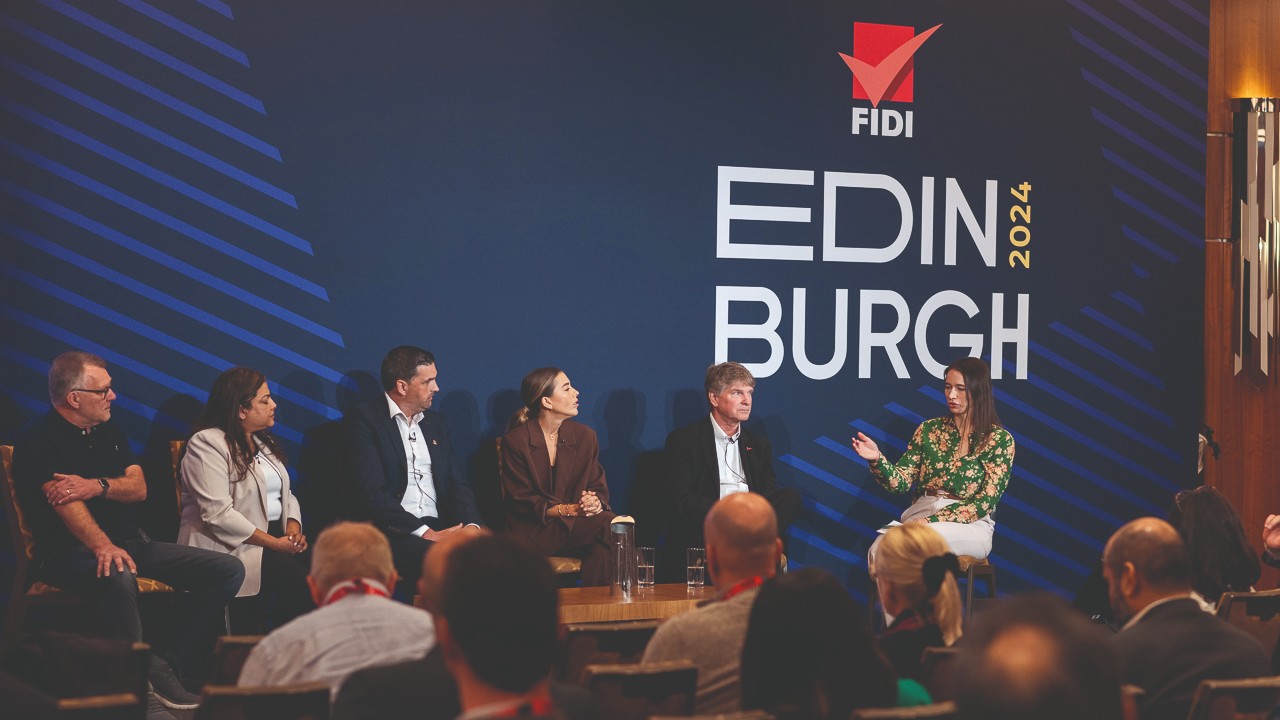After a lively debate on the next generation of movers at the FIDI Conference in Edinburgh, FIDI 39 Club President Jackie Stouffer gives her thoughts on attracting and retaining quality talent in the moving industry
Recently, I received a message from my firm’s reception telling me that a company had left a message for me regarding the Feed the Animals Conference in Edinburgh. I read this several times, perplexed, thinking how did this person get my contact details and what could they possibly want? Then I said it out loud and it dawned on me: the FIDI Annual Conference! I had good laugh and am thinking about petitioning the Secretary General to officially adopt this as the new conference nickname.
Now that I have captured your attention, I’d like to draw it to the recent panel that the FIDI 39 Club hosted at that annual conference in Scotland.
It was the first panel that the FIDI 39 Club had hosted and moderated at the conference, on the topic of attraction and retention of young talent in our industry. Panellists for this lively debate included FIDI 39 Club members Daniela Krumdiek and Christina McCarte, as well as Gordon Bell, Steve Jordan and Simon Hood. It’s a subject about which the club feels strongly – as evidenced by our Scholarship and Mentorship Programmes – and one that is highly relevant in today’s job market.
Two important parts of this topic are tightly intertwined, and companies must strike the right balance between the two. You will attract new talent if you can demonstrate a happy and high-performing team (retention), and you will retain strong, high-performing talent if you can lay out demonstrable career paths and make timely hires (attraction) to allow for career progression of your employees.
This model, of course, assumes company growth – which, for the purpose of this article, I will assume is the end goal of most companies.
Let’s start with retention. One thing the panel agreed on was that creating the right company culture and employee experience is critical to retaining talent in the current environment. In my own experience as a multi-generational manager, and through my research leading up to the panel at the FIDI conference, the primary drivers to stay at a company across different generations differ. As a leader in your company, you have to be agile and able to adapt or you will not succeed in your retention goals.
For example, the Baby Boomer generation valued stability in a job, good standard benefits and, if lucky, a pension. Contrast that with Gen Z, who are looking to be part of something meaningful and make a difference through their work, while, at the same time, prioritising their work-life balance and life experiences above all else.
As a leader and manager in your company, how do you manage this wide array of expectations simultaneously? Gordon and Christina summed it up nicely, recommending that the best way to achieve such a dynamic is to promote open communication among your team, up and down. Honest feedback goes a long way to promoting a healthy environment that benefits all generations.
Daniela also presented the idea of offering non-traditional benefits – I will call them ‘lifestyle benefits’. She listed a number of small and highly viable changes that most companies could incorporate easily into their business model, which would make the culture more approachable, specifically to the Millennial and Gen Z demographics.
Examples include a flexible employee arrival time (starting earlier or later depending on their personal priorities), giving employees a day off for their birthday, and, of course, offering a more flexible approach to the work day in general. Other lifestyle benefits that younger generations may value more than their Gen X and Boomer counterparts include childcare, pet insurance, and wellness benefits.
Retention needs to remain a priority among companies for long-term corporate sustainability, but I was struck by some of the feedback that the FIDI 39 Club has received in its Mentorship Programme.
We routinely ask participants how long they have been in the industry and how long they have been at their current company. I am constantly surprised that they are often at one company for all or the majority of their career. Maybe this means we are better at retaining than we think we are… so maybe the issue is not so much retention as attraction of new talent?
Steve Jordan had strong opinions on this topic, claiming we are shooting ourselves in the foot by constantly downplaying the industry and what it has to offer. He has a point – who would want to work for an industry that is always saying how ‘unsexy’ it is? Not me.
We have to keep in mind that the incoming generation have grown up with information at their fingertips their entire lives. They have been immersed in technology and can, and will, research companies to the greatest extent possible.
There is even more opportunity for open and honest online employee reviews than ever before. If we, as an organisation, are not cultivating the sort of corporate culture and employee experience that we would be comfortable being promoted honestly to the world, is it our fault if we fail to attract talent in this ever-evolving market?
I don’t have all the answers, but it is certainly an area that can be corrected with the proper steps and mindset, with a focus on building a brighter future for our industry.
Maybe we don’t use the term ‘Feed the Animals’ (I doubt that will help our aim of attracting or retaining talent), but the focus does need to be on nurturing our existing employees, our corporate cultures, and our overall means of recruiting fresh talent.

